Swirl of rumours fuels petrol shortage
Some petrol stations stop supply expecting possible increase in fuel price

As rumours about an impending increase in the prices of petroleum products are rife, oil shortage has again gripped the country mainly because of hoarding of stocks and failure of several companies to import the commodity.
Last month, the government had raised the price of petrol and diesel by Rs35 per litre each, a couple of days before the scheduled date of revising oil prices, apparently bowing to hoarders rather than taking action against them.
Some petrol pumps have now stopped the supply to customers as they plan to store the commodity and sell it after a likely increase in the price in the coming days.
However, some companies that failed to import the petroleum products due to issues in the opening of Letter of Credit (LCs) were also unable to supply the fuel to their retail outlets, which led to the shortage of products.
Sources told The Express Tribune that the country had sufficient stocks of petrol and diesel to meet the demand for around next 20 days.
They said that currently, only six top companies -- Pakistan State Oil, Total, Go, Shell and APL -- had the stocks of petroleum products. The country has a total of 9,800 petrol pumps out of which the six companies have a network of 6,000 retail outlets.
The remaining oil marketing companies have not been able to import petroleum products due to issues in the opening of LCs to feed the rest of 3,800 retail outlets.
Industry officials noted that the burden of 3,800 retail outlets had also been shifted to the retail outlets of six companies, observing that the current crisis could prolong due to the IMF deal as there was no dollar in the market to import the petroleum products.
The Oil Companies Advisory Council (OCAC) had already warned the State Bank of Pakistan governor and petroleum division that oil crisis was looming in the country due to issues in the opening of LCs to import the petroleum products.
Even, some cargoes of PSO had been cancelled because of the LC issue.
Petroleum dealers maintained that they were facing shortage of products as the oil marketing companies had not been supplying fuel to them.
A spokesperson for Oil and Gas Regulatory Authority (Ogra) said that teams had been dispatched to check the availability of petrol and diesel at the stations.
He added that the teams were also being sent to petroleum companies’ depots to check the supply of products, noting that the country had sufficient stocks of petrol and diesel.
Another official said that the regulator had written letters to the oil marketing companies to take action against those petroleum dealers who were involved in the hoarding of products.
Sources said that the petroleum division held a meeting, which was presided over by State Minister for Petroleum Musadik Malik.
The moot while reviewing the availability of petroleum stocks was informed that there was no shortage of oil in the country.
The oil companies’ representatives were directed to take action against those petroleum dealers who were involved in the hoarding of petroleum products. The regulator had also written letters to provincial governments for the purpose.
The state minister for petroleum did not respond when contacted.
It has been observed that the performance of petroleum division had been questionable since the coalition government came to power. It had even failed to overcome the gas crisis that had crippled the life of the people.
Experts say there seemed no governance as the petroleum division had failed to handle the oil dealers’ mafia that had been looting the consumers by creating artificial shortage of petrol and diesel.
They said that the explosive department working under the administrative control of the petroleum division had powers to cancel the licence of petroleum dealers, adding that it never used the authority to take action against the oil dealers’ mafia.
Even, oil marketing companies could take action against the petroleum dealers by suspending supplies of fuel but they had also been reluctant to take action, the experts said.
Rather than taking action, federal government puts the responsibility on the provincial governments to take action against petroleum dealers, they added.



















COMMENTS
Comments are moderated and generally will be posted if they are on-topic and not abusive.
For more information, please see our Comments FAQ